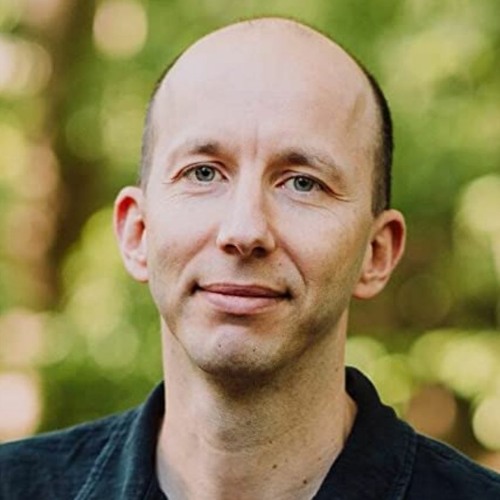Herman Pontzer explains where our calories really go, and what studying humanity’s past can teach us about staying healthy today.

Duke professor Herman Pontzer has spent his career counting calories. Not because he’s watching his waistline, exactly. But because, as he sees it, “in the economics of life, calories are the currency.” Every minute, everything the body does — growing, moving, fighting infection, even just existing — “all of it takes energy,” Pontzer says.
In his new book, “Burn,” the evolutionary anthropologist recounts the 10-plus years he and his colleagues have spent measuring the metabolisms of people ranging from ultra-athletes to office workers, as well as those of our closest animal relatives, and some of the surprising insights the research has revealed along the way.
Much of his work takes him to Tanzania, where members of the Hadza tribe still get their food the way our ancestors did — by hunting and gathering. By setting out on foot each day to hunt zebra and antelope or forage for berries and tubers, without guns or electricity or domesticated animals to lighten the load, the Hadza get more physical activity each day than most Westerners get in a week.
So they must burn more calories, right? Wrong.

Pontzer and his colleagues have found that, despite their high activity levels, the Hadza don’t burn more energy per day than sedentary people in the U.S. and Europe.
These and other recent findings are changing the way we understand the links between energy expenditure, exercise and diet. For example, we’ve all been told that if we want to burn more calories and fight fat, we need to work out to boost our metabolism. But Pontzer says it’s not so simple.
“Our metabolic engines were not crafted by millions of years of evolution to guarantee a beach-ready bikini body,” Pontzer says. But rather, our metabolism has been primed “to pack on more fat than any other ape.” What’s more, our metabolism responds to changes in exercise and diet in ways that thwart our efforts to shed pounds.
What this means, Pontzer says, is you can walk 16,000 steps each day like the Hadza and you won’t lose weight. Sure, if you run a marathon tomorrow you’ll burn more energy than you did today. But over time, metabolism responds to changes in activity to keep the total energy you spend in check.
Pontzer’s book is more than a romp through the Krebs cycle. For anyone suffering pandemic-induced pangs of frustrated wanderlust, it’s also filled with adventure. He takes readers on an hours-long trek to watch a Hadza man track a wounded giraffe across the savannah, to the rainforests of Uganda to study climbing chimpanzees, and to the foothills of the Caucasus Mountains to unearth the 1.8 million-year-old remains of some of the first people who trekked out of Africa.
His humor shines through along the way. Even when awoken by a chorus of 300-pound lions just a few hundred yards from his tent, he stops to ponder whether his own stench gives him away, and what he might do if they come for his “soft American carcass, the warm triple crème brie of human flesh.”
Pontzer spoke via email with Duke Today about his book:
Q: What’s the lesson the Hadza and other hunter-gatherers teach us about managing weight and staying healthy?
A: The Hadza stay incredibly fit and healthy throughout their lives, even into their older ages (60’s, 70’s, even 80’s). They don’t develop heart disease, diabetes, obesity, or the other diseases that we in the industrialized world are most likely to suffer from. They also have an incredibly active lifestyle, getting more physical activity in a typical day than most Americans get in a week.
My work with the Hadza showed that, surprisingly, even though they are so physically active, Hadza men and women burn the same number of calories each day as men and women in the U.S. and other industrialized countries. Instead of increasing the calories burned per day, the Hadza physical activity was changing the way they spend their calories — more on activity, less on other, unseen tasks in the body.
The takeaway for us here in the industrialized world is that we need to stay active to stay healthy, but we can’t count on exercise to increase our daily calorie burn. Our bodies adjust, keeping energy expenditure in a narrow range regardless of lifestyle. And that means that we need to focus on diet and the calories we consume in order to manage our weight. At the end of the day, our weight is a matter of calories eaten versus calories burned — and it’s really hard to change the calories we burn!
Q: You’re saying that exercise doesn’t matter? What’s the point, if we can’t eat that donut?
A: All those adjustments our bodies make responding to exercise are really important for our health! When we burn more calories on exercise, our bodies spend less energy on inflammation, stress reactivity (like cortisol), and other things that make us sick.
Q: What’s the biggest misunderstanding about human metabolism?
A: We’re told — through fitness magazines, diet fads, online calorie counters — that the energy we burn each day is under our control: if we exercise more, we’ll burn more calories and burn off fat. It’s not that simple! Your body is a clever, dynamic product of evolution, shifting and adapting to changes in our lifestyle.
Q: In your book you say we’re driven to magical thinking when it comes to calories. What do you mean by that?
A: Because our body is so clever and dynamic, and because humans are just bad at keeping track of what we eat, it’s awfully hard to keep track of the calories we consume and burn each day. That, along with the proliferation of fad diets and get-thin-quick schemes, has led to this idea that “calories don’t matter.” That’s magical thinking. Every ounce of your body — including every calorie of fat you carry — is food you consumed and didn’t burn off. If we want to lose weight, we must eat fewer calories than we burn. It really comes down to that.
Q: Some people say that if the cavemen didn’t eat it, we shouldn’t either. What does research show about what foods are “natural” for humans to eat?
A: There’s no singular, natural human diet. Hunter-gatherers like the Hadza eat a diverse mix of plant and animal foods that varies day to day, month to month, and year to year. There’s even more dietary diversity when we look across populations. Humans are built to thrive on a wide variety of diets — just about everything is on the menu.
That said, the ultra-processed foods we’re inundated with in our modern industrialized world really are unnatural. There are no Twinkies to forage in the wild. Those foods are literally engineered to be overconsumed, with a mix of flavors that overwhelm our brain’s ability to regulate our appetites. Now, it is still possible to lose weight on a Twinkie diet (I’m not recommending it!), if you’re very strict about the calories eaten per day. But we need to be really careful about how we incorporate ultra-processed foods into our daily diets, because they are calorie bombs that drive us to overconsume.
Q: If we could time travel, what would our hunter-gatherer ancestors make of our industrialized diet today?
A: We don’t even need to imagine — We are those hunter-gatherers! Biologically, genetically, we are the same species that we were a hundred thousand years ago, when hunting and gathering were the only game in town. When we’re confronted with modern ultra-processed foods, we struggle. They are engineered to be delicious, and we tend to overconsume.
Q: Has the COVID-19 pandemic brought any of these lessons home for you? What can we do to keep active and watch what we eat, even while working from home?
The pandemic has been a tragedy on so many levels — the loss of life, those suffering with long-term effects, the social and economic impacts. The impact on diet and exercise have been bad as well, for many of us. Stress eating is a real phenomenon, and the stress and emotional toll of the pandemic — along with having easy access to the snacks in our kitchen — have led many to gain weight. Physical activity seems to have declined for many. There aren’t easy answers, but we should try to make a point to get active every day. And we can help ourselves make better decisions about food by keeping ultra-processed foods out of our houses. You can’t plow through a bag of chips if you don’t have chips in your cupboard.
Q: You’ve measured the energy costs of activities ranging from taking a breath to doing an Ironman. What is one of the more extreme or surprising calorie-burning activities that you’ve measured, or would like to measure, in humans or some other animal?
A: With colleagues from Japan, I measured the energy cost of a heartbeat – a tricky bit of metabolic measurement! Turns out each beat of your heart burns about 1/300th of a kilocalorie! Amazing how efficient our bodies can be.
Q: What is something people have questions about that we just don’t know the answer to yet? What would it take to find out?
A: Right now we’re excited about measuring the adjustments our bodies make when we increase our exercise: how exactly does burning more energy on physical activity impact our immune system, our stress response, our reproductive system? It will take a long-term study of exercise to see how these systems change over time.

